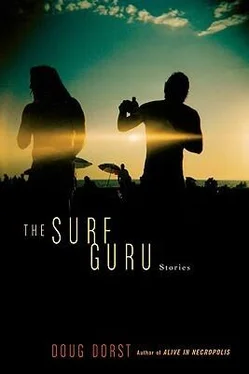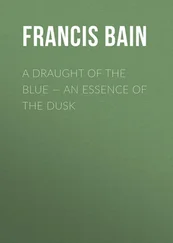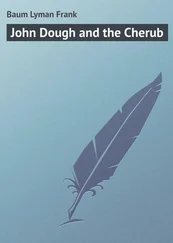11. Dr. Gachet, with the heartbroken expression of our time [#2] (September 1890)
Instead of a mirror, he uses the first portrait to guide him. It is a rare gift, he thinks, to be able to paint oneself as one has been seen most truthfully — distilled, by a great artist, down to one’s very essence. With a strong and sure slap of blue, he begins his work — another Gachet in Tasso’s pose, at once homage, memoir, collaboration. His mind whirls and he paints, artist and subject in the purest senses.
Changes: softer sky, a less-jagged blue rain. Remove the Goncourt brothers’ books — those cadmium yellow blocks — a distraction, a xanthopsic redundancy — for is not the essence of brotherliness already concentrated in this very act of creation, this self-portrait of portrait? The foxglove must remain, though — yes, those sprigs of Digitalis purpurea , those twinned stems of indigo teardrops — it remains — remains — as does all the world’s melancholy, always bearing down—
Outside the sun sinks, and the shadows in the room deepen. At one point, his brush hand shakes and tingles so badly that he has to pause to fetch a fresh bottle of Elixir. It is night when he finds himself watching himself from above, watching in the guttering lamplight as his hand, firm and steady, signs the canvas Vincent, watching as his body collapses into a chair, watching as this one iteration of him falls into a long, deep, holy sleep.
12. At the Folies Bergère, watching Loïe Fuller (March 1892)
He watches her dance, this American sensation, this ethereal sylph. She pirouettes and spins, her flowing white costume awhirl about her, diaphanous veils fluttering and flaring in light that spins and flashes and wheels and washes in soft creamy white and in cool complementary pairs: pink and pale green, orange and cyan, purple and yellow. She is an unfurling flower, then a flame, then a butterfly.
The music ceases. A barrage of applause then, and the dancer disappears behind the brocaded curtain. The stage is dark, empty, but Dr. Gachet still feels her shining, sinuous grace, feels it as surely as if it were a thick impasto sky under his fingertips.
Closing time is called, and although around him chairs are sliding and groaning on the wooden floor, feet are shuffling, elbows are nudging, and voices are prodding barmen with One last drink, please , Dr. Gachet sits quiet and still, his eyes closed, colorful circles and swirls burning the dark inside him. He feels time’s fingers curled around his fragile heart, pinching and releasing, pinching and releasing, teasing and teasing him; one day they will clamp down and crush it in a fist. He sees himself stretched out in a white nightgown while his son sits at his bedside sketching his pale dead face. He sees his son and daughter growing old and silent and alone together in the house at Auvers as they sit and watch the red pigments in the artist’s paintings fade to bloodless pink. He sees a newborn rabbit, finger-sized, squirming in a patch of thistles in the garden, blind and helpless and moist and new.
A strong arm guides him out into the night. Colors streak and voices yammer and nothing makes sense until he spots that stunted, drunken Toulouse-Lautrec under a gas lamp, wobbling on his cane and addressing a small circle of laughing men and painted women. Dr. Gachet pushes past all the bodies and, breathing heavily, presses a bottle of Elixir into the tiny, crooked man’s hand.
“What’s this?” the painter asks. “Why are you—?”
“I can help you grow,” the doctor says.
The Monkeys Howl, the Hagfish Feast
It is past midnight. The kid is tired after a long day of marching and slashing through undergrowth and dodging ambushes, but he has been forbidden to sleep. He would like to swim in the cool ocean, but he has also been forbidden to swim or dip or even wade. Nor may he remove his boots to wrinkle his burning toes in the spent waves that bubble over the sand. He has been forbidden even to sit. He has strict orders, from the general himself. He must stand and guard Sergio’s head.
The kid does not understand why the head must be guarded. Who would want it? It is a dead thing, caked in blood, with a sour, meaty stink that the ocean breeze cannot carry away. Flies buzz dizzily around it, then alight and prowl its terrain.
The head rests in the dry sand, well above the tide’s reach. The kid nudges it with his boot, rolls it facedown. He finds its weight disconcerting. He tamps it solidly so it will not roll back. The flies resettle upon the head as soon as he takes his foot away.
Looking out over the rippling black waves, he reaches into the pocket of his worn canvas trousers and with one finger traces the scalloped edge of the photograph of Alvaro’s novia . The photograph is the prize of prizes, coveted by all, and now it belongs to him. He wants to take it out to admire her, but the night is moonless — and, in any event, he cannot afford to be seen with his attention on anything but the head. Still, the image of the woman is clear in his mind, feels like something rare and vital. He has been running through forests and jungles and scorched plains with the rebels since his voice was high and thin; he has never tasted a secret kiss in the shadow of a giant yucca, or peeled off a blouse steeped in cool feminine sweat after a climb up the volcano, or raised a skirt in the salty dark under the wharf.
He touches himself through a hole in his pocket and is pleased to encounter his own warmth. He handles himself tenderly, with slow, deliberate strokes of his thumb and forefinger, keeping his arm still so that anyone watching him will see only a soldier attentively performing his duty. In the water, creatures phosphoresce, wink.
Farther up the beach, Alvaro lies open-eyed on his plastic tarp, which crinkles beneath him as he rolls over and back, over and back. He cannot sleep. His feet are covered in sores and blisters and fungus. The sand fleas are biting. The saraguate monkeys are howling in the forest. Most of all, he is angry about the photograph. He is unaccustomed to losing. He is a gambler who leaves little to chance.
Earlier that evening, after the general had given the order, the entire army circled around Sergio and chanted a countdown from ten; on the beat of zero, Alvaro swung his bolo knife, and the blood arced high and misted dozens of dirty faces. The men clustered around the two pieces of Sergio and watched the blood winding through the sand toward the ocean. They placed bets on how far the blood would run.
He should not have risked the photograph, but he could not resist; he could tell the other men were going to guess poorly, planting their sticks high up on the beach, underestimating how much blood there is in a man. His bet raised the stakes, forced all the others to search their packs and pockets for their things of greatest value. Then Alvaro silently computed the coagulation time, the slope of the beach, the absorbency of the black volcanic sand, the temperature and humidity, the speed of the wind off the ocean, and he drove in his stick at the water’s edge.
He should have won. Something was wrong with Sergio’s blood.
The kid took away quite a haul: two kilos of foot powder; a pocket watch and four rings; a silver revenge charm; dozens of cigars; a necklace of monkey teeth, all polished and sharpened; a vial of bone dust looted from some old saint’s reliquary; many grenades; a glass eye; and the photograph. This kid! So young he can’t keep his hands off himself for five minutes at a time! The photograph must be retrieved soon. It won’t be long before the kid splashes himself all over it.
Читать дальше












